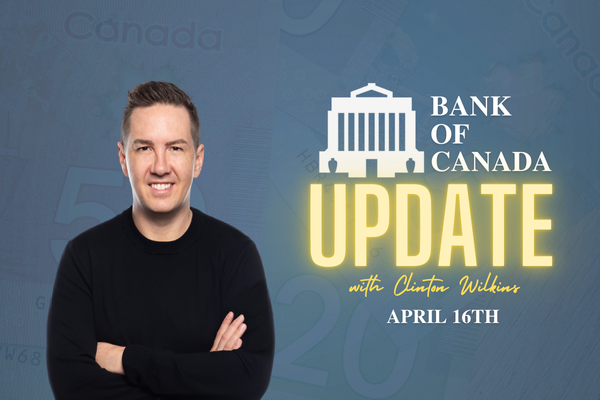On 95.7 News Radio, Clinton and Todd discussed the Yukon's government's new first-time home buyer program, offering low-interest loans to cover up to half of down payments while highlighting similar programs in Nova Scotia and New Brunswick.

CityNews – Mortgage Industry Challenges | November 21, 2023
Clinton Wilkins joins “Now You Know” with Rob Snow on CityNews to discuss the current challenges in the Mortgage industry, including solutions for the housing affordability crisis, why current solutions are limiting, how to get amortizations in line and rate predictions for 2024.
Rob Snow 00:05
Possible solutions for the housing affordability crisis. And what about hard hit mortgage holders who might need to renew? It’s fall economic update day, with Chrystia Freeland, the finance minister taking center stage two hours from now. This is now you know, I’m Rob Snow.
Announcer 00:28
From politics, to your money, your health, your family and community. Getting the answers from the experts who know and asking the questions that matter to you. This is now you know, with Rob Snow on City News.
Rob Snow 00:46
We do expect some sort of language in this afternoon’s fall economic update that might offer something in the way of relief for mortgage holders worried about their prospects, given the recent cycle of interest rate increases needed to beat back inflation. What are some options? Let’s talk housing with Clinton Wilkins of Clinton Wilkins mortgage team, Centum home lenders. He joins us from Dartmouth Nova Scotia. Hi there.
Clinton Wilkins 01:16
Thanks for having me.
Rob Snow 01:18
It’s great to hear from you. So first of all, very general question. How’s business?
Solutions for the housing crisis and mortgage relief
Clinton Wilkins 01:24
Business in Nova Scotia is actually quite strong. I can tell you there certainly not as many purchase transactions happening as there has been the last three years. I think overall, we’re maybe soft compared to last year by about 10%, which I feel very fortunate for. I can tell you, we have colleagues in Ontario and in BC that are down 35% and 50%. Obviously, the amount of mortgage transactions nationally is down. I think it’s down 20, 25% or so. And that’s just a symptom of what’s going on currently with rates. The chief economist for Scotiabank, I think went out on a limb during one of their last updates, and said, you know, he feels that the rates are 200 basis points higher than they really need to be now at this time.
Rob Snow 02:08
Okay, so let’s talk about some of the things that we’re hearing. You have a wish list. Okay, I’m giving you a wish list. Okay, for your clients. This is what the federal government can do to help your clients. What’s on that wish list of yours? What’s on that wish list?
Clinton Wilkins 02:29
I can tell you my wish list has been going for a long time. And I think one of the top things is around the stress test. You know, I think the stress test needs to be revisited. So I think that’s one. I think for markets like on Ontario and BC, doing high ratio insured mortgages with the Canadian Mortgage and Housing Corporation, Sagen or Canada Guarantee for properties over $1 million. I think that would be great. And I think a high ratio insured mortgage with a 30 year amortization. I think that certainly will help specifically first-time homebuyers get in to the market. There certainly has been some good news over the last, you know, few months. I think one is the clarification from the office of the financial superintendent saying that insured, so high ratio transfers, with CMHC insurance do not need to requalify moving from lender to lender. So there certainly has been some good news. But I think there can certainly be some more good news here in this update.
Rob Snow 03:29
Yeah, it’s interesting that you would mention that Clinton because on my kind of a list that I have in front of me here two things, I wanted to specifically ask you about. One, amortizations, extended amortizations. And the stress test, this idea that people have to qualify, I think it’s two percentage points above whatever it is the posted rate. Posted 5 year rate, I guess, right? Yeah, yeah.
Clinton Wilkins 03:54
Yeah, it’s 2% above their contract rate. Or we’re going to call it the contract rate. So 2% above the contract rate, or the qualifying rate. So currently, the qualifying rate is 5.25. Literally 100% of the transactions that we’re qualifying now are on 2% above the contract.
Bringing amortizations in line with lump sum payments
Rob Snow 04:15
Okay, what we are hearing about is something called a a mortgage charter. Now, I don’t know the details on that we’re all waiting until four o’clock Eastern time to hear what exactly that might mean a mortgage charter, but what do you think that might mean?
Clinton Wilkins 04:35
I think that there may be some more language around renewals and clients making lump sum payments to right their amortizations. As you know, there’s been a lot of noise in the media around borrowers that have negative amortization. So there’s certain lenders of the big five for clients that have a variable rate mortgage, that allow the mortgage to go into a negative amortization, which really means every month that goes by the clients owe more than they did the previous month. Some of these mortgages have very small prepayment privileges, you know, ie maybe zero to 10% per year. And I think the federal government will certainly hopefully, implore the banks to allow borrowers to make lump sum payments to bring their amortizations back in line. I think another, you know, key point that, you know, it’s been discussed in the media is clients that are under stress, you know, charging them a penalty when they break their mortgage, if they need to sell their home. I think that will happen, and it has happened. And I think if the rates are still going to continue to be high, over the next 6, 8, 10, 12 months, there’s going to be more Canadians that need to sell their home when that mortgage comes up for renewal.
Property regulations and mortgage debt limits
Rob Snow 05:50
There might be something in there, this has been telegraphed by the government, stronger language about people who are involved in short term rentals, investment properties, Airbnb type properties and removing some of the incentives to engage in that activity. What do you think about that?
Clinton Wilkins 06:12
You know, I’ve seen it happening now in certain municipalities here in Halifax, we basically have outlawed Airbnbs, unless it’s in your primary residence or in a commercial zone. So I think some municipalities certainly have taken that action, you know, without waiting for provincial or federal governments to you know, bring in any legislation. I think the one thing that the government was kind of floating around was a calculation based on the maximum amount of mortgages that you can have based on your income. I think that is going to certainly have impacts for people that own Airbnbs, but also residential rentals. As you know, you can get a residential mortgage on a rental property, it doesn’t need to be a commercial mortgage. And there’s certainly some people that have many residential rental properties. And they’re able to get financing through kind of traditional means. What I think the federal government may bring in is a limitation on how many or how much mortgage debt someone can have based on their total income.
Rob Snow 07:15
We’re joined by Clinton Wilkins from Dartmouth, Nova Scotia, where he is part of the Clinton Wilkins mortgage team. What have you thought of what the government has done thus far to try and make housing more affordable, particularly for younger buyers, those looking to get into the housing market for the very first time, there are a few things CMHC for example, has, you know, first time homebuyers incentive, 5% or 10% for a first time buyers purchase of a newly constructed home, 5% for a first time buyers purchase of a resale or an already existing home. There’s also the savings account, the FHSA I believe it’s called. First home savings account, right? Yeah. What do you what do you think of those measures? How effective have they been? What do you think?
Housing affordability measures are limiting
Clinton Wilkins 08:11
I think it’s disjointed personally, the first time homebuyers incentive, I think it works in Atlantic Canada, and I think it works in the prairies. But those are the only areas that it works. The traditional homebuyers plan, the RRSP program, each borrower can borrow up to 35,000 from their RRSP. So there’s two borrowers each can borrow 35,000. And, you know, $70,000, towards the down payment, in theory is, you know, a lot of money. But the challenge is a lot of properties that are being purchased now have a purchase price over a million dollars, which require a minimum of a 20% down payment. So I think that does become limiting. I think the first home savings account, again, is another good program in theory, but I don’t think a lot of language has rolled out and even when I look at the language of the financial institutions individually, you know, have been promoting. It’s very complicated and cumbersome. I don’t think that they’ve made it easy. But I almost feel that the government’s intention, they’re trying to flow, obviously, the housing market, and that obviously does impact first-time homebuyers as well.
Rob Snow 09:19
Okay, so just circling back to your wish list. The keys would be amortizations, longer amortization, so lower the overall monthly payment and the stress test. Those are the two keys right?
Clinton Wilkins 09:37
I would 100% agree, I think a 30 year high ratio insured mortgage, I think would be great for first time homebuyers. And I think the stress test needs to be reevaluated. You know if we’re at the peak of the market in terms of rates, and I think by and large, the economists think that right now, why are we qualifying on a rate that’s 200 basis points above the current contract rate. It’s outdated nd it does need to be revisited.
Rates to soften in the next 6-8 months
Rob Snow 10:02
In the mortgage broker community right now we’re going to hear from the Bank of Canada in about two weeks or so on the next move for rates. On the 6th, I believe, of December.
Clinton Wilkins 10:14
The first Wednesday of December.
Rob Snow 10:16
Yeah, what’s the consensus? That they’re done right now?
Clinton Wilkins 10:21
I think they’re done. I think they’re done. I think we’re in a plateau situation. I think it’s commonly assumed right now. And I mean, economists get this right 0% of the time. So I think we need to remember this. But I think the consensus is that the rates are going to soften coming into next summer. So I think we’re in a little bit of a plateau. And I think a plateau is better for Canadians than an increasing rate environment. Just being that we can now plan maybe the next 6, 8, 10, 12 months for our lives. We know the rates are going to be high, we can plan for that. And then hopefully, the rates are going to soften then going forward. The one thing I will say there’s certainly been a spike in the popularity of variable rate mortgages. As we know all the rates are high right now. But more and more clients are choosing to do a variable rate just with the expectation that the rates are going to start softening midway through 2024.
Rob Snow 11:12
Okay, I thank you for your time today. Greatly appreciate it.
Clinton Wilkins 11:16
Thanks for having me.
Rob Snow 11:17
Clinton Wilkins, Clinton Wilkins Mortgage Team, Centum Home Lenders, Dartmouth, Nova Scotia.


